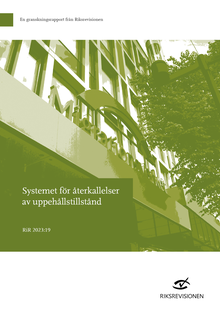Major shortcomings in revoking residence permits
If a person is no longer permitted to stay in Sweden, their residence permit must be revoked. The Swedish National Audit Office’s audit shows that there are thousands of cases where this has not been done.

Photo: Migrationsverket / Björn Bjarnesjö
The Swedish Migration Agency may revoke a residence permit, work permit or a declaration of protection status for a number of reasons. The Swedish National Audit Office’s audit shows that this process has major shortcomings.
The audit shows that in 2020 alone, there were just over 13,000 cases with strong grounds for investigating whether the person fulfils the conditions for their residence permit.
When, for example, a person with a permanent residence permit emigrates permanently, the Swedish Migration Agency must revoke their permit. Yet the audit shows that about 9,000 people retained their permanent residence permit despite emigrating.
In addition, almost one in four people with a permit for study purposes completely lacked register data for studies in Sweden and one in ten people with a work permit had no registered earned income.
This has had implications for the public economy, according to the audit. Government agencies and municipalities made undue payments of up to SEK 430 million during 2013–2022. Some of the payments have been disbursed to people whose residence permit has been revoked, and some to people who have emigrated permanently without having their permanent residence permit revoked.
“These shortcomings lead to efficiency problems, in part because the Government and the Swedish Migration Agency have not sufficiently prioritised these matters. This doesn’t square with the agency’s remit under the law,” says Auditor General Helena Lindberg.
For example, between 2013 and 2022, the Government did not provide the Swedish Migration Agency with any objectives, tasks or reporting requirements concerning revocations. The Swedish Migration Agency has not produced any cohesive process for initiating, investigating and deciding on these cases. Neither are revocations included in the Swedish Migration Agency’s internal production targets, follow-up or resource allocation.
The shortcomings are also due to the fact that many agencies with information that the Swedish Migration Agency needs in order to initiate and investigate revocations are, due to legislation, not permitted to share it with the Swedish Migration Agency. For example, the Swedish Tax Agency’s population register can receive information that conflicts with the conditions for a person’s residence permit, without being permitted to inform the Swedish Migration Agency. The Swedish Social Insurance Agency and the Swedish Pensions Agency can register that a person has emigrated without being permitted to inform the Swedish Migration Agency.
In addition, when the Swedish Migration Agency revokes a residence permit, this decision does not always become legally binding, because the Swedish Migration Agency has difficulty in serving the person in question with the decision. And, even if the decision is served, the Swedish Migration Agency does not always register this in its case management system, which means that the decision is still not legally binding. Almost half of all revoked residence permits in 2013–2022 do not have a registered date on which the decision was served or became legally binding.
“These permits are often valid, despite having been revoked. Consequently, these people can continue to travel into and reside in Sweden and can apply for and obtain services and benefits to which they should no longer have been entitled,” says Tommi Teljosuo, project leader of the audit.
Recommendations in brief
The Swedish National Audit Office recommends that the Government consider making it mandatory for the agencies concerned to exchange information of relevance to decisions on revoking residence permits.
The Swedish Migration Agency should improve its work on serving decisions and review the possibility of making information concerning period of validity and revocation more available to agencies that need it in their processing.
See the audit report for the full recommendations.
Press contact: Olle Castelius, phone: +46 8-5171 40 04.
Presskontakt: Olle Castelius , telefon: 08-5171 42 06.
Share in social media and by e-mail
Contact form
Send your questions or comments via the form below and we will make sure that they reach the right member of staff. Please state if your question concerns the information on this particular page.


